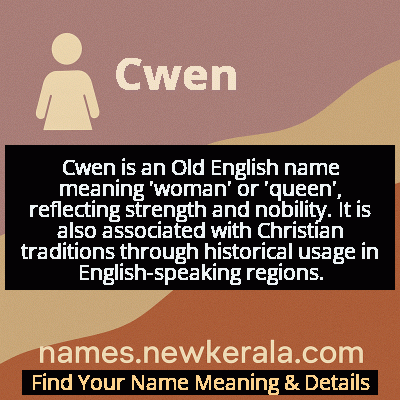Cwen Name Meaning & Details
Origin, Popularity, Numerology Analysis & Name Meaning of Cwen
Discover the origin, meaning, and cultural significance of the name CWEN. Delve into its historical roots and explore the lasting impact it has had on communities and traditions.
Name
Cwen
Gender
Female
Origin
Christian
Lucky Number
9
Meaning of the Name - Cwen
Cwen is an Old English name meaning 'woman' or 'queen', reflecting strength and nobility. It is also associated with Christian traditions through historical usage in English-speaking regions.
Cwen - Complete Numerology Analysis
Your Numerology Number
Based on Pythagorean Numerology System
Ruling Planet
Mars
Positive Nature
Generous, passionate, energetic, and humanitarian.
Negative Traits
Impulsive, impatient, moody, and can be overly emotional.
Lucky Colours
Red, maroon, scarlet.
Lucky Days
Tuesday.
Lucky Stones
Red coral, garnet.
Harmony Numbers
1, 2, 3, 6.
Best Suited Professions
Military, sports, philanthropy, leadership roles.
What People Like About You
Courage, energy, leadership, generosity.
Famous People Named Cwen
Cwen of Mercia
Anglo-Saxon Queen
Wife of King Coenwulf of Mercia, influential figure in early English monarchy
Cwenburh of Wessex
Anglo-Saxon Princess
Daughter of King Cerdic of Wessex, known for her diplomatic marriages
Cwenhild of Kent
Religious Leader
Abbess who established several religious houses in medieval England
Name Variations & International Equivalents
Click on blue names to explore their detailed meanings. Gray names with will be available soon.
Cultural & Historical Significance
During the Christianization of England, names like Cwen represented the blending of traditional Germanic culture with new Christian values, creating a unique Anglo-Saxon Christian identity that valued both strength and faith in female leaders. The name's usage declined after the Norman Conquest in 1066, when French names became fashionable, but it remained in use in certain noble families who resisted Norman influence. In modern times, Cwen has become symbolic of England's pre-Norman heritage and is often chosen by families seeking to reconnect with their Anglo-Saxon roots while maintaining Christian naming traditions.
Extended Personality Analysis
Individuals named Cwen are typically perceived as natural leaders with strong organizational abilities and innate dignity. They often exhibit a calm authority that inspires confidence in others, combined with a protective nature toward those in their care. Historically associated with nobility, modern Cwens tend to demonstrate excellent judgment, emotional intelligence, and the ability to mediate conflicts effectively. Their leadership style is often characterized by wisdom rather than dominance, making them respected figures in both professional and personal settings.
Cwens typically possess a strong sense of responsibility and ethics, often serving as moral compasses in their communities. They balance traditional values with progressive thinking, creating stability while embracing necessary change. Their name's royal connotations often manifest as a natural grace under pressure and the ability to handle complex situations with poise and strategic thinking. Many Cwens develop interests in history, governance, or community service, reflecting their name's heritage of leadership and service. They tend to be decisive yet considerate, combining the strength of their convictions with empathy for others' perspectives.
Modern Usage & Popularity
In contemporary naming practices, Cwen has emerged as a distinctive choice for parents seeking names with historical depth and royal significance without being overly common. While it doesn't rank in the top 1000 names in most English-speaking countries, it has developed a niche following among history enthusiasts, families with Anglo-Saxon heritage, and those interested in medieval studies. The name's usage has seen gradual increase in the UK, particularly in regions with strong historical connections to Anglo-Saxon England. Modern Cwens often appreciate their name's uniqueness and the conversation it sparks about English history and language. The name appeals to parents looking for strong female names that convey leadership qualities while maintaining feminine grace. Its revival reflects broader trends toward historical names and the rediscovery of pre-Norman English culture and language.
Symbolic & Spiritual Meanings
Symbolically, Cwen represents sovereignty, feminine power, and benevolent authority in its purest form. The name carries deep metaphorical significance as a bridge between ancient traditions and contemporary values, embodying the concept of leadership that serves rather than dominates. In psychological terms, it symbolizes the integration of strength and compassion, authority and empathy. The name also represents cultural continuity and resilience, having survived from Anglo-Saxon times through various historical transformations. In Christian symbolism, Cwen connects to the concept of Mary as Queen of Heaven and the Church as the bride of Christ, adding spiritual dimensions of devotion and sacred leadership. The name serves as a reminder that true power lies in wisdom and service, making it symbolically rich for modern individuals seeking names with both historical weight and contemporary relevance.

